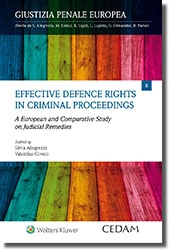The European Union has adopted several Directives harmonising the rights of the suspects and accused persons in criminal proceedings. The effectiveness of defence rights granted by EU legal instruments does not simply rely on their correct implementation in national law, but also depends on the existence of enforcement and control mechanisms granting judicial protection to individuals. Although the Directives impose remedial obligations on the Member States, the different structure and scope of judicial control under national law is likely to undermine the justiciability of procedural safeguards granted by EU law.
Divergences among national criminal justice systems raise further challenges in the field of cross-border cooperation. In light of the recent case law of the European Courts, the present book explores the scope and meaning of the right to effective judicial protection in criminal proceedings in relation to the first three Directives of the Stockholm roadmap. It offers a comparative analysis of the national implementations of these so-called ABC Directives in six Member States, focusing on legal remedies that ensure the effectiveness of the rights granted by the EU Directives. This volume presents the results of a study carried out by a group of European criminal law experts from 2015 to 2017 thanks to the financial support of the EU Commission.


